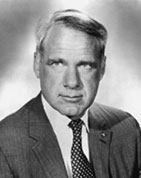James Schlesinger

Former U.S. secretary of energy
James Rodney Schlesinger (born 1929) was an intelligent and strong-minded conservative whose professorial expertise led to a controversial career in government which included several appointments by President Nixon, one of which was secretary of defense, from which he was fired by President Ford, and his appointment by President Carter as secretary of energy, from which he was forced to resign.
James R. Schlesinger was born and reared in a middle-class Jewish family in New York City. His early years coincided with the Great Depression and World War II. But the most indelible mark left on him was that of the formative years of the Cold War, which he experienced as a student at Harvard where he earned A.B., A.M., and Ph.D. degrees in economics. During these years he toured Europe on a fellowship and emerged with a no compromise attitude towards the Soviet Union. He also converted to the Lutheran Church and married Rachel Mellinger. Together they had eight children (four sons and four daughters).
In 1955 Schlesinger began his professional career as assistant professor of economics at the University of Virginia. His first and only monograph, The Political Economy of National Security (1960), received mixed reviews, including one which noted a tendency to speak ex cathedra. Despite that early indication of an impolitic style, the conservative content attracted the favorable attention of the RAND Corporation, which Schlesinger joined in 1963. He rose to the position of director of strategic studies and also served as a consultant to the Bureau of the Budget.
With Richard Nixon's presidential victory in 1968 Schlesinger became assistant director of the Office of Management and Budget, where he earned a reputation for winning a six billion dollar cut in the Defense Department budget. This cutback did not stem from a "dovish" perspective. On the contrary, one of the central tenets of Schlesinger's thought was the belief that the Soviet leadership could not be trusted. A corollary was that the United States must maintain military supremacy at all costs. This "hard line" did not, however, lock Schlesinger into any one system or weapon. In 1974, for example, he proposed the development of the MX missile, yet as a member of the Scowcroft Commission in the early 1980s he opposed its further development.